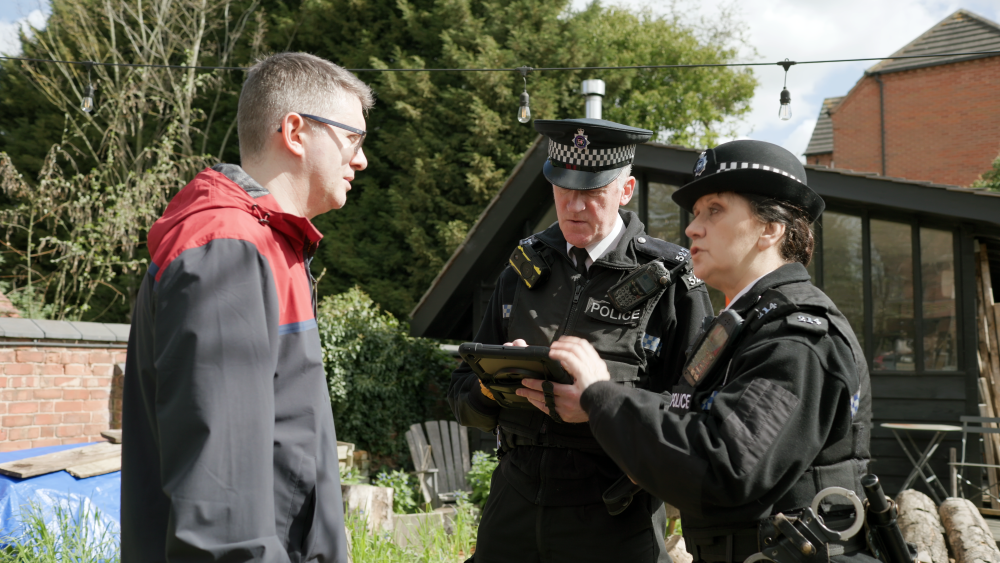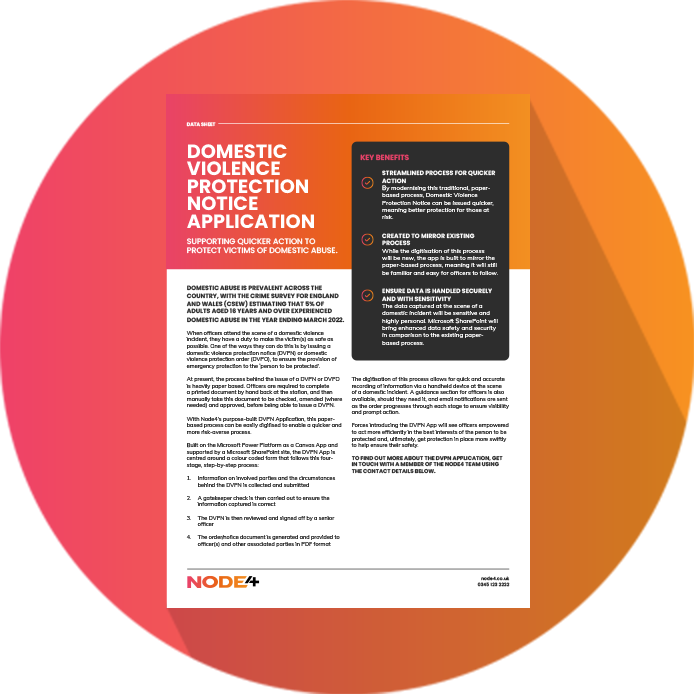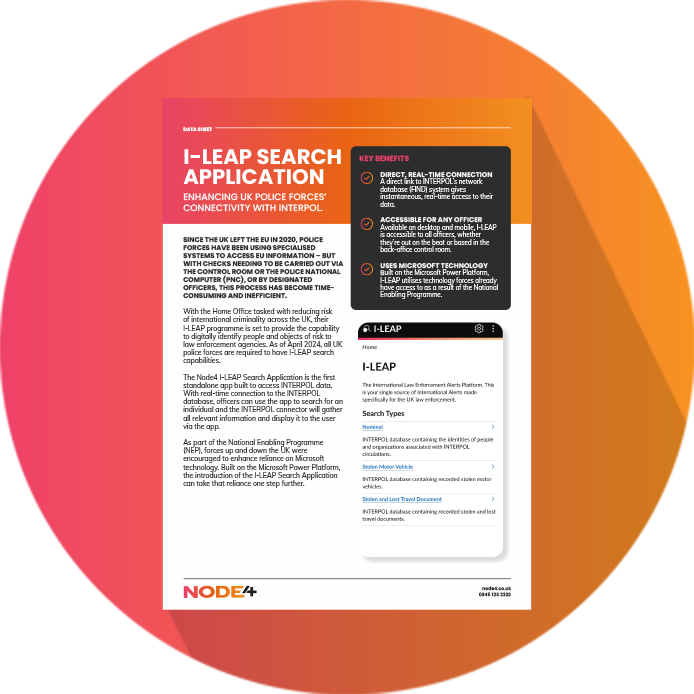UK policing is facing numerous challenges due increasing pressures to enhance efficiencies and streamline operations. With a mixture of external contributing factors, our police forces deal with the impact of changing policy, public perception, technological advancements and regulatory compliance.
In this blog, we’ll address options for UK police forces to use low-code technologies to tackle and overcome common challenges whilst identifying the most effective methods for implementing change.
CHALLENGES FACED IN POLICING
If you were to conduct a PESTLE (Political, Economic, Social, Technological, Legal and Environmental) analysis, you would find there are hundreds of factors impacting policing today, with more to develop in the next 12 to 18 months. With a new political party in power, we expect that new agendas will be drafted, regulations will be updated and enhanced – all which police forces need to be aware of and adhere to. We frequently work with forces who are required to carry out data returns, adhere to specific standards and be compliant with regulations such as Management of Police Information (MoPI).
The examples below outline policing challenges that can be helped with low-code technologies:
ADMINISTRATION:
Police officers often spend significant time manually capturing information (e.g. statements, sudden death or use of force notices, community speed watch etc.) which is handwritten and requires manual data entry later. This results in large amounts of paperwork, manual approvals and usually requires the officer to be present at their station.
These time-consuming tasks result in reduced availability of resource for critical duties, increase risk of manual errors and can often delay critical processes linked to crime prevention.
How can low-code tech help?
- Standardise data entry
- Enable data entry from any location when using mobile-offline capabilities enable data entry from any location
- Consolidate and share data easily whilst maintaining robust security levels

NEED FOR RAPID RESPONSE:
In emergency situations, timely access to real-time information is critical. Delays in information retrieval can delay response times and decision-making which can be the difference between life and death.
In police control rooms, agents should be able to capture information quickly and easily from 999 and 101 calls, and prioritise these requests. An increase in demand on 101 numbers has lead to members of the public accessing information from other sources.
How can low-code tech help?
- Providing a full end-to-end contact centre capability
- Using chat bots to provide information to telephone callers, or automatically route a call through to an agent for high-priority calls
REGULATORY COMPLIANCE:
Police forces must adhere to strict regulations and standards, ensuring compliance, particularly when it comes to data entry, processing and sharing of large data volumes. Naturally, adopting new regulations takes time, planning and usually technology to fulfil. Historic solutions would usually take months, if not years to enable compliance due to code-first approaches or the requirement to bring in excessive resource numbers.
How can low-code tech help?
- Forces can quickly prototype solutions, using existing resources and supporting faster times to production
- By using existing product sets within the force, change can be enacted quickly and easily
COMMUNITY ENGAGEMENT:
Building trust and maintaining open communication with the community is vital. More than ever, police forces are looking for multi-channel engagement, such as using Facebook Messenger, WhatsApp, and other social platforms to help engage with the local community. Better still, police forces will volunteer at events, have officers walk the streets and engage with online groups to pass information back into the community. Historically, engagement can be time-consuming and have low-effectiveness, however thanks to modern low-code technologies, police forces can now use social media platforms to help identify suspects, such as in the instance of the recent UK riots.

WHY DOES LOW-CODE MATTER?
Low-code platforms such as the Power Platform support organisations adopt and enact change quickly and easily without needing to break the bank. Frequently organisations already have licenses for the required technologies, as well as pockets of skills across the business. By using these tools, mitigating risks and overcoming challenges becomes less of a burden and instead an opportunity to help increase process efficiency, make effective use of data whilst also aligning to organisational strategy.
With low code becoming increasingly popular as the first option for driving business value, police forces are looking to use what they already have. One option is to use the Microsoft Power Platform Centre of Excellence which combines technology with a series of processes. These processes can help drive a data culture, develop a community of practice whilst also enabling rapid prototyping and engaging the wider organisation. Here is where a Microsoft Partner such as Node4 can help police forces quickly implement technology and processes to support adoption.
EXAMPLE IMPLEMENTATION
Several UK police forces have already adopted low-code technologies to overcome challenges.
West Mercia Police have adopted Victim Assist which helps provides victims of crimes with the tools they need. With a rich community engagement, plus the option to expand over multiple channels and collaborate with partner organisations, their low-code tool can now adapt and grow with the business regardless of the challenges they face.
Warwickshire Police is another example where several applications have been developed to help with Use of Force, Community Speed Watch and Stop and Search. These apps use low-code technologies to capture and manage data. In the instance of Stop and Search, this has been adopted by the Police Digital Service and is available from their solutions catalogue.
OUR LOW-CODE CATALOGUE
Node4 have been at the forefront of developing low-code solutions in policing with several of our offerings available through the PDS solutions catalogue. In addition to the above, we’ve also developed the following applications in collaboration with police forces.
DVPN
Legacy processes for raising domestic violence protection notices and orders (DVPN/O) are reliant on the heavy use of paper, and manual approvals. Using a low-code interface, the PDS and West Yorkshire Police are now able to collect relevant information and approvals automatically, whilst providing digital updates as the DVPN goes through each stage of the process. The force now has a streamlined process for quicker action, which mirrors the existing process albeit using modern technology. This approach supports faster product adoption whilst having a meaningful and impactful result.
FIND OUT MORE ABOUT NODE4’S DVPN APPLICATION
Ensuring a victim’s safety is a high priority for police officers. Node4’s DVPN application can digitise the process of issuing protection orders to ensure the provision of protection to the ‘person to be protected’ – find out more in our datasheet.
HOW CAN WE HELP

I-LEAP
The UK Government specified a requirement that all police forces have a solution to carry out INTERPOL searches this year. This came as a result of leaving the EU and the existing process, which saw officers needing specialist systems and checks that needed to be carried out by control rooms or PNC. To ensure that technology and process wasn’t a limiting factor, Node4 developed the I-Leap tool which utilises a real-time connection to INTERPOL. Rather than using a time-consuming and inefficient process, UK police forces now have a direct connection which is accessible to all officers through the power of Microsoft technology.
DISCOVER MORE ABOUT THE I-LEAP SEARCH APPLICATION
As of April 2024, all UK police forces need to have I-LEAP search capabilities – this is a Home Office requirement. Node4’s I-LEAP Search Application is the first standalone app built to access INTERPOL data.
Take a look at our handy datasheet to learn more about the app and the key benefits it offers for police forces.
HOW CAN WE HELP

OCSET
Handling intelligence and activity allocation, activities had been captured and processed using an Excel workbook. These activities are categorised into packages and moved to enforcement teams. The data captured would be manual, capturing around 70 fields of data. The information gathered provides intelligence on child sexual exploitation cases and supports sharing info to other agencies such as the Home Office and National Crime Agency. By using low-code technologies, the information captured could be standardised, shared out to all parties automatically and support automated operational reporting. West Mercia Police recently issued a statement to the BBC on their investment in Power Apps:
“By investing in tools such as the Power App, all official bodies can play their part in ensuring these heinous crimes are stamped out of our society and can ensure if CSE is reported, that action is taken immediately,”
BEST PRACTICE
Implementing any low-code solution requires careful planning and execution. There are a number of best practice options however we would recommend using the help of a Microsoft partner who has hands-on experience in implementing these technologies.
Below are a few examples of best-practice to get you started on low-code adoption:
IDENTITY KEY AREAS OF AUTOMATION:
We often recommend organisations undertake a Business Value Assessment (BVA) to help identify the best areas of improvement. This activity ensures that organisations realise value quickly and do not waste time on activities that have less business impact. By focusing on areas with high administrative burdens, or those critical to operational efficiency, police forces can quickly look at optimising day to day operations using low code.
INVOLVE STAKEHOLDERS:
Engaging stakeholders early, (including police officers, admin teams, contractors and the community) to develop processes is paramount. Their insights and feedback are crucial to ensure that the applications and processes develops meet real needs and are user-friendly. Specifically, when working in the community, understanding the best channels of engagement can ensure transformation is relevant and effective.

CONTINUOUS EVALUATION:
Assuming you take the route of implementing a CoE, deployment is only the first step. By continuously evaluating business needs, feedback, performance and adoption, organisations can make quick changes to better suit evolving challenges. Using feedback, necessary improvements and updates can be made to ensure low-code applications remain effective and relevant. More importantly, this means change can persist and is not a one-time event.
CONCLUSION
The adoption of a low-code solution, such as Microsoft’s Power Platform, offers significant benefits to UK policing. By automating routing tasks, optimising resource management, enhancing real-time information access and acting as a platform which can grow with evolving needs, low code is here to stay. These tools can help organisations overcome key business challenges using a low-cost option. Low-code applications represent an opportunity in policing by addressing critical business challenges and enabling streamlined operations.
Taking on these new challenges can be daunting however, that’s why Node4 would be a great option when identifying a Microsoft partner who has experience delivering these technologies and has a tried-and-true record working with UK police forces. With our full catalogue of low-code applications, and an approach to drive platform adoption, Node4 can help you tackle key business challenges using modern technologies. Better still, with a series of accelerators, the time to value is reduced significantly, ensuring police forces can overcome challenges faster than ever.
GET IN TOUCH
If you’d like to know more about our IT support for Public Safety & National Security, or the wider range of services we provide that can benefit your organisation, get in touch with us today. Our team of technology in policing experts will be happy to help with any query you may have about national security technology.
You can also learn more about our range of services, including our cloud solutions, data centre services, colocation hosting and managed IT services.
GET IN TOUCH
Contact us using the form and we’ll get back in touch shortly. Please use the telephone number below to call us, or drop us an email if you’d prefer.
